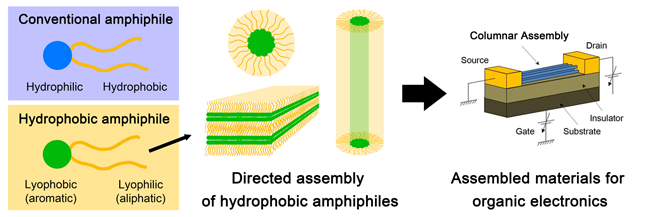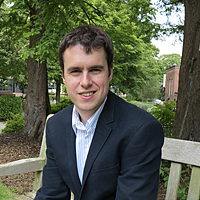Biography
I was appointed as a Lecturer at Keele at the end of May 2013. Before this, I first spent 7 years at the University of Bristol, where I received my undergraduate masters degree and doctorate. For the latter, I worked in the group of Prof. Julian Eastoe, studying surfactant chemistry and the use of small-angle neutron scattering to probe nanosized self-assembled structures.
After graduating in 2009, I moved to the Max-Planck Institute of Colloids and Interfaces, Potsdam-Golm, Germany, to work as a postdoctoral researcher with Prof. Helmuth Möhwald on the development of self-healing corrosion-resistant coatings. In 2011 I received a JSPS postdoctoral fellowship to work in the National Institute for Materials Science, Tsukuba, Japan with Dr Takashi Nakanishi, and subsequently became a researcher in the International Center for Young Scientists at the same institute.
My research in Japan concerned the synthesis, characterisation and application of organic "hydrophobic amphiphiles" for organic electronics. This remains my main topic of interest and is introduced in more detail in the research section.
Research and scholarship
My research looks at molecular self-assembly. In particular, I'm interested in amphiphilic molecules that are capable of forming useful structures and materials. Previously, this has concerned more conventional surfactants (i.e. detergent molecules), and has included their development for low polarity solvents such as liquid CO2, and their use in templating nanoparticles and mesoporous solids.
More recently I've mainly focussed on a group of so-called "hydrophobic amphiphiles", which are asymmetric molecules that have both aliphatic and π-conjugated parts. Using principles adopted from surfactant chemistry, with additives that favour either part, we have shown that these molecules can be driven to reversibly self-assemble into useful shapes, such as wires or sheets.
When stacked in the correct alignment, π-conjugated molecules can do useful things such as conducting charge. Consequently, they are heavily researched for use in organic electronic devices, (e.g. transistors, solar cells, light emitting diodes), which have the potential to be flexible and foldable, as well as being cheaper to produce than those made using high purity silicon. Devices constructed from self-assembled molecules should (theoretically) have optimal properties, controlled by intermolecular packing, which should be tuneable through changing either the molecular structure or external conditions. However, the ability to do this remains a major challenge! Our "directed assembly" method not only works (the structures conduct charge), but also gives a general approach to tuning self assembly in many functional systems.

A major technique that I use to characterise the above molecular assemblies is small-angle scattering, using neutrons or X-rays. These techniques are typically carried out at large government-owned facilities, such as ISIS or Diamond near Didcot, UK and represent a powerful way to resolve bulk-averaged nanometre-sized structures in-situ.
For more information, please see my personal website.
Teaching
Modules that I will be involved with:
- CHE-10047 Chemical Concepts and Structure
- CHE-10048 Practical and Professional Chemistry Skills 1 (Module Leader)
- CHE-10049 Practical and Professional Chemistry Skills 2
- CHE-10050 Chemical Reactions and Properties
- CHE-10052 Mathematical Tools and Concepts in Chemistry
- CHE-20029 Radicals, Phases and Supramolecular Chemistry
- CHE-30002 Dual Honours Research Project
- CHE-30037 Topics in Chemistry (Module Leader)
- CHE-30040 Chemistry Research Project
- CHE-30041 Medicinal Chemistry Research Project
- CHE-30042 Inorganic, Physical and Solid State Chemistry
- CHE-30044 Topics in Medicinal Chemistry (Module Leader)
Publications
School address
Lennard-Jones School of Chemical and Physical Sciences
Lennard-Jones Building
Keele University
Staffordshire
ST5 5BG, UK
Phone (School Office): +44 (0)1782 733033, (Chemistry): +44 (0)1782 731693, (Forensic Science): +44 (0)1782 731694, (Physics): +44 (0)1782 733527
Email: scps@keele.ac.uk
Information for schools and colleges
Programme directors
Chemistry and Medicinal Chemistry
Dr Tess Phillips
Tel : +44 (0)1782 733038
Email : t.r.phillips@keele.ac.uk
Dr Chris Hawes
Tel : +44 (0)1782 732820
Email : c.s.hawes@keele.ac.uk
Forensic Science
Dr Jamie K. Pringle
Tel : +44 (0)1782 733163
Email : j.k.pringle@keele.ac.uk
Physics and Astrophysics
Dr Arumugam Mahendrasingam
Tel : +44 (0)1782 733312
Email : a.mahendrasingam@keele.ac.uk
Admission tutors
Chemistry and Medicinal Chemistry
Dr Natalie Capel
Tel : +44 (0)1782 733584
Email : n.j.capel@keele.ac.uk
Forensic Science
Dr Natalie Capel
Tel : +44 (0)1782 733584
Email : n.j.capel@keele.ac.uk
Physics and Astrophysics
Dr Patrick Connell
Tel : +44 (0)1782 733892
Email : physics@keele.ac.uk or p.j.connell@keele.ac.uk


